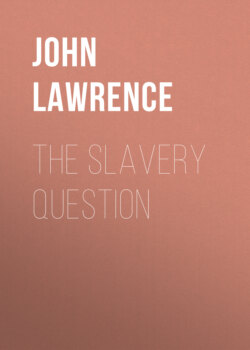Читать книгу The Slavery Question - John Lawrence - Страница 3
На сайте Литреса книга снята с продажи.
PREFACE.
ОглавлениеTable of Contents
American slavery is a great sin—a complicated iniquity—a gigantic barbarism—and it “is evil, only evil, and that continually.” But the depth of this wickedness is not very frequently sounded, if, indeed it can be sounded. The magnitude of this crime is not often measured, if, indeed it is possible to determine its dimensions.
Slavery has narcoticized the consciences of the American people to a most alarming extent. A deep sleep has come over the moral sense, which it would seem cannot be broken by the cries and entreaties of three millions of wretched bondmen. Are we not in imminent danger of being cursed with Pharaoh’s hardness of heart? May we not be visited speedily with judicial blindness such as was inflicted upon the doomed nations and cities of antiquity?
The standard of national morality has been degraded to the level of an infamous lower law enacted by scheming political traders.
Our national government, in all its departments—Executive, Judicial and Legislative—has been transformed into a pliant tool in the hands of an unscrupulous oligarchy.
The powerful American Churches have ceased to be asylums for the oppressed, defenders of the down trodden, uncompromising foes of tyranny, and they have become, on the contrary, the apologists of oppressors, a terror to the oppressed, and the only reliable bulwark of American slavery.
The author has aimed to present in the following pages such a discussion of the general subject of slavery as would be calculated to awaken the thoughts, and feelings, especially of those who have not had an opportunity of examining this question in larger and more ably written productions. There are thousands of honest people who would take a decided position on a Christian anti-slavery platform, and throw their whole influence in the right direction if they were made acquainted with slavery as it is, and with their duties religiously and politically in relation to it. It is with the design of benefiting the common people—the people of plain sense—who are not offended at plain talk and plain facts, that the following work is published. If the workingmen of the free and slave States can be aroused into action, slavery must fly from the churches and perish from the nation.
With this purpose in view, we have sketched a history of the African slave trade, showing how slavery originated; have defined slavery—proving that its essential principle is property in a human being; and laws, facts and incidents have been adduced to illustrate the system so that even a child may see and feel its enormity.
And, as a corrupt moral sense has been still more corrupted by efforts to bring revealed religion to the support of slavery, particular pains have been taken to prove that not a single word, nor precept, nor example can be adduced from the Bible which sanctions any such system; and that the whole spirit of religion as revealed under the old economy and the new, is utterly and irreconcilably opposed to all slavery.
It has been thought proper to present a concise view of the position occupied by the American Churches upon this question. No church can complain when its ecclesiastical action on so grave a subject is re-published. And besides, it is quite necessary for honest people to know on what platforms the religious denominations of the country stand.
The true position of a religious society or church in relation to slavery is exhibited. This is a point of more than ordinary importance. The doctrine is maintained that the honor of the Bible, the purity, power, peace, and success of the Church, its duty to God, to freedom, to slaveholders and especially to slaves, demand that it have no fellowship with slaveholding.
Particular pains have been taken to point out the political duties of Christians in relation to slavery.
The inquiry, “how are we to get rid of slavery?” is taken up, and the position assumed and defended that it ought to be abolished immediately.
The book closes with a glance at the prospects. The watchman tells us that the sky from many points of observation is dark, but still that there are some very encouraging indications. The uncorrupted conscience, reason, truth, Christianity and prayer, are on the side of the oppressed; and God, who is love, is their hope, and cannot fail to come to their help and bring them forth with a mighty hand and an out-stretched arm.
Quite a number of works on slavery have been consulted in the preparation of this discussion, among which may be mentioned, “American Slave Code” by Mr. Goodell; “Barnes on Slavery;” “Bible Servitude,” by E. Smith; “Elliott on American Slavery;” “Slavery and the Church,” by Mr. Hosmer; “Debate on Slavery by Blanchard & Rice;” “Non-fellowship with Slaveholders,” by Mr. Fee; “Sermon on the Slave Trade” by Jonathan Edwards; and “Thirteenth Annual Report of the American and Foreign Anti-slavery Society.”
No “mealy words” have been used in this book. I have only aimed to present the plain truth, and shall be rewarded in whatever mite of influence it may cast on the side of liberty.
[Pg vi]
[Pg vii]
